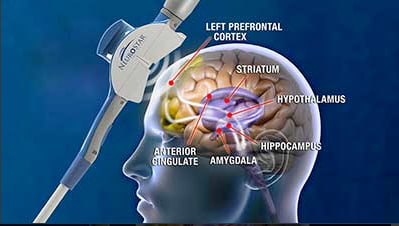Transcranial Magnetic Stimulation Offers Hope for Treatment-Resistant Depression
In December of 2012, Stephanie S. was taking 300 mgs of sertraline (Zoloft), 300 mgs of (bupropion Hcl) Wellbutrin, 300 mgs of trazodone hydrochloride (Desyrel), 200 mgs of risperidone (Risperdal), and 8 mgs of alprazolam (Xanax), but was as depressed as she has ever been. She had also gained 100 pounds as a side effect of all the medications. Having tried a total of 10 different kinds of drugs with no success, her doctor recommended transcranial magnetic stimulation (TMS), a non-invasive procedure that stimulates nerve cells in the brain with short magnetic pulses. A large electromagnetic coil is placed against the scalp which generates focused pulses that pass through the skull and stimulate the cerebral cortex of the brain, a region that regulates mood. The procedure was approved by the FDA in 2008.




